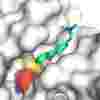Research funded by the generosity of people like you has led to a better understanding of how bowel cancer develops and identified a new way to prevent it. The research, led by Professor Louis Vermeulen and his team at Amsterdam UMC, has now resulted in a clinical trial that will aim to repurpose a psychiatric drug as a new preventive cancer treatment in a group of people that – without intervention – are virtually 100% likely to develop bowel cancer in their lifetime.
The support from Worldwide Cancer Research was essential and it provided the first insights into how different mutations impact on cell competition in the intestine for various mutations. It really laid the groundwork for these discoveries and without the help of Worldwide Cancer Research we would not have been able to now try and get these important finding to patients.

Cancer development is an evolutionary process in which cells that have acquired mutations that give them a growth advantage outcompete healthy cells.
Professor Vermeulen’s lab discovered that although mutations that are frequently found in bowel cancer do provide a growth advantage, they are still often replaced by healthy cells.
In this way, the body stops the accumulation of too many mutant cells in the bowel to prevent cancer developing. Unfortunately, this process isn’t 100% effective, which is why people still develop bowel cancer.
In 2014, your support allowed Professor Louis Vermeulen to pursue a brilliant idea. What if they could find a way to boost this natural defence mechanism and help healthy cells keep the mutant cells under control?
Results from the research revealed for the first time how mutant stem cells in the gut win the upper hand against healthy cells and ultimately form tumours. His team’s work showed that the mutant stem cells actively emit signals that sabotage the function of healthy stem cells in the gut.


The team also discovered a way to prevent the mutant stem cells from interfering with the healthy ones. Lithium, a commonly used drug for the treatment of several psychiatric disorders, prevented them from taking over and forming tumours in mice by rendering the healthy stem cells insensitive to the damaging signals.
Thanks to these findings, a clinical trial funded by the Dutch Cancer Society (KWF) testing the effect of lithium on bowel cancer development in individuals with familial adenomatous polyposis (FAP) - a relatively uncommon genetic syndrome - will now be performed in the Netherlands.
FAP patients develop hundreds of non-cancerous polyps and adenomas in their bowel and without treatment nearly all of them will develop bowel cancer between the ages of 35 and 45.
The trial is set to recruit 10 young adult patients with FAP and will observe the patients before, during and after treatment with lithium for a total of 18 months. Results of the clinical trial are likely to build the basis for larger trials with more patients.
By becoming a Curestarter, you can help us continue to support more bright ideas like Professor Vermeulen's - allowing us to potentially uncover new knowledge about cancer that could lead to lifesaving new ways to prevent, diagnose, and treat cancer.

Donate now & become a Curestarter
Be part of a united effort to stop lives being cut short by cancer.



